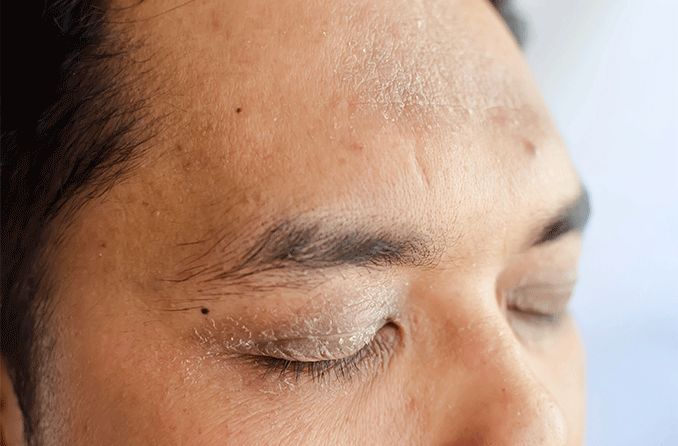Eyelid eczema: Causes, symptoms and treatment

Eyelid eczema is a non-contagious skin condition that can cause the delicate skin of the eyelid to become red, puffy and dry.
While eczema (atopic dermatitis) can cause skin inflammation anywhere on the body, it is most commonly found on the ankles, elbows, hands and feet. The skin of the eyelids may be especially prone to irritation because it is thin and has less fat and more blood vessels than skin in other places on the body.
Eczema on the eyelid is more common in patients who also have eczema on other areas of their body, and, according to the Review of Ophthalmology, about 80% to 90% of patients with eyelid eczema are female.
Symptoms of eyelid eczema
If you’ve had eczema elsewhere on your body, you may wonder if your red, irritated eyes are caused by eczema. Common symptoms of eczema on the eyelids include:
Burning and itching of the eyes
Puffy, swollen eyelids
Pink or red skin around the eyes
Scaling or dry skin on the eyelids
The symptoms of eyelid eczema can mimic those of other conditions, so it’s important to see an eye doctor for proper assessment, diagnosis and treatment.
Causes of eczema on eyelids
One of the most common causes of eczema on the eyelids is an allergic reaction to a product used on or around the face (or even somewhere else on the body).
Common triggers include cosmetics, eye drops, hair dyes, nail lacquers and soaps. A metal tool such as an eyelash curler can also lead to eyelid eczema, and there’s at least one known case that resulted from wood glue used in furniture making.
Eczema tends to run in families, so you may be more likely to develop eyelid eczema if a parent, sibling or other close family member has eczema. Like eczema anywhere else on the body, eyelid eczema can also be triggered by anxiety and stress.
SEE RELATED: Can you be related to eyeglasses?
Is eyelid eczema the same as eyelid dermatitis?
Yes, eyelid eczema may also be referred to as eyelid dermatitis, as dermatitis, a term for inflammation of the skin, and eczema are often used interchangeably.
The eyelids can be affected by several types of eczema, including atopic dermatitis, the most common form of eczema. “Atopic” means there’s a genetic predisposition to develop an allergic disease because the immune system is more likely to react strongly to certain allergens and irritants. The following types of eczema can also affect the eyelids:
Contact dermatitis
Neurodermatitis
Seborrheic dermatitis
Eyelid psoriasis vs. eczema
Eyelid psoriasis may resemble eyelid eczema due to similar symptoms of redness and scaly skin. However, these are two different conditions that can both occur on the eyelids.
Psoriasis is a disease that doctors believe is caused by an immune system problem that leads to red, scaly, patchy skin on some parts of the body. While genetics may be a contributing factor, it's not known exactly what causes psoriasis on the eyelids or elsewhere on the body. However, it is rare to get psoriasis around the eyes. If you think you may have eyelid psoriasis, it's important to visit an eye doctor.
Eyelid eczema treatment
If you have eczema on the eyelid, your eye doctor will examine your eyes and ask you questions about your symptoms, the personal care products you use and any new additions to your routine that may have triggered the eczema. In some cases, you might be able to treat eyelid eczema simply by avoiding the irritant that causes your eczema.
In other cases, your doctor may prescribe a medication for eyelid eczema. The downside is that some of these drugs can't be used for a long time due to risk of additional eye issues. Common eczema treatments include:
Allergy testing – Your doctor may be able to order patch testing to find out if you have a specific allergy and find the product that's causing your eyelid eczema. If a product is identified, your doctor will recommend you discontinue using it. You may be able to switch to a milder product, free of irritating chemicals and perfumes.
Oral steroids – Corticosteroid medications such as prednisone may help tame eczema but can't be continued long-term due to side effects that can include cataracts, glaucoma and high blood sugar.
Topical creams – Your doctor may prescribe a steroid cream to apply to the skin of the eyelid. Steroid creams can only be used temporarily because long-term use may lead to cataracts and glaucoma.
An injectable drug – Injections of dupilumab (Dupixent) may be used to treat chronic eczema, but there are risks of side effects involving the eye, such as conjunctivitis and dry eye syndrome. Worse, patients with eczema may be more prone to these eye problems. If you take this drug and experience blurred vision, other eyesight changes or eye redness, it's important to see an eye doctor right away.
You can typically get eczema treatment from your family physician or dermatologist, but if you have eczema on the eyelids or around the eyes, or if you develop an eye-related issue from a medication, you should make an appointment with your eye doctor.
In many cases, eyelid eczema can get better within a month or so with the right treatment, or after identifying and avoiding the right trigger. But for some people, eczema may continue to recur, even after multiple rounds of treatments.
Page published on Wednesday, January 20, 2021






